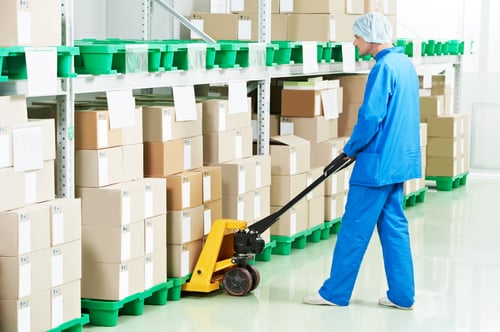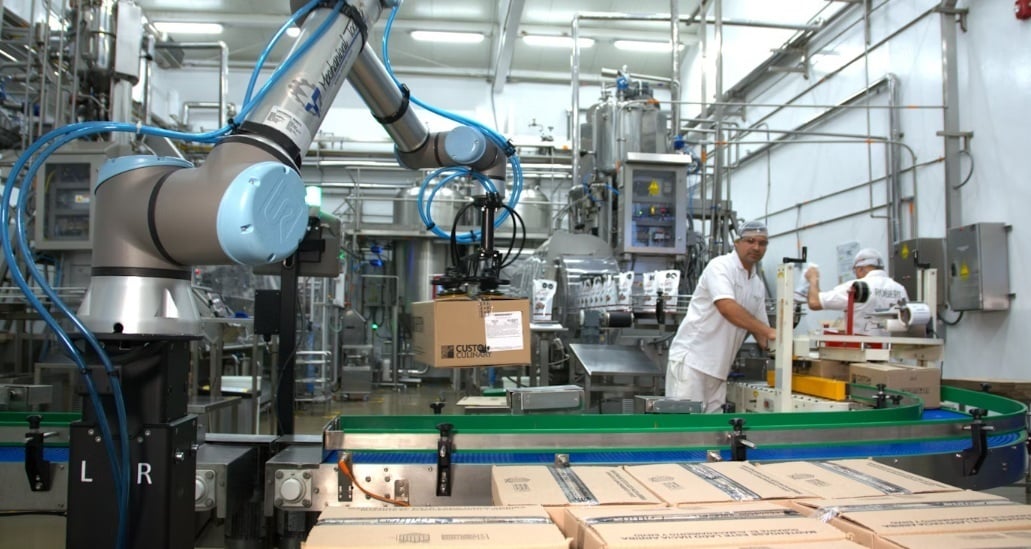How to Ensure Integrity of Pharmaceutical Products with Robotic Palletizing

Posted on Jul 31, 2025 in Palletizing
5 min read time
The pharmaceutical industry is heavily regulated to ensure the safe delivery of medicines and healthcare products. This makes it a particularly challenging industry when we're talking about shipping and logistics.
There are many beneficial applications of robotics in the pharmaceutical industry, including the assembly of medical devices, filling and sealing medicinal products, and machine tending of test equipment. However, palletizing is often one of the best first automation projects in the pharmaceutical industry, as it is easy to deploy and can have a quick payback time. And it can directly affect your logistics.
Palletizing is a key step for ensuring the integrity of your products during shipment. If you use the wrong types of pallets, pack them incorrectly, or fail to meet the necessary regulations, you could jeopardize an entire shipment.
In this article, we explore how pharmaceutical companies can use robotic palletizing to meet shipment regulations and help make their end-of-line process more efficient.
Why regulations are key in pharmaceutical logistics
The pharmaceutical industry is notoriously slow to adopt new technologies because of the strict regulations that affect almost all aspects of a business.
The specific regulations that govern your pharmaceutical company's logistics will depend on where you are in the world.
For example, Good Manufacturing Practices (GMPs) are one set of regulations that apply to European and American pharmaceutical companies, amongst others. The GMPs dictate that you must ensure the quality and safety of your products at all stages of production, including during transportation and storage.
The reason for this deep regulation is clear: the quality of pharmaceutical products directly affects people's health. In other industries, say the consumer goods industry, the impacts of poor quality tend to be less catastrophic than in the pharmaceutical industry.
Logistics is key for a range of reasons, such as:
-
Late delivered or damaged orders can lead to patients not receiving potentially life-saving products.
-
Poorly packaged or shipped products can compromise the effectiveness or safety of those products in ways that might not be obvious (such as shipping products at the wrong temperature).
-
Bad tracking of products can mean that the wrong products are sent to a medical establishment.
By improving your shipment process – such as by adding robotic palletizing – you can reduce these risks, helping you to meet the relevant regulations for your business.

The cold chain in pharmaceutical logistics
One aspect of logistics that is hugely important for pharmaceutical companies is the concept of the "cold chain". It plays a critical role in delivering temperature-controlled products safely.
Cold chain management involves a range of strategies, practices, and technologies to transport and store perishable goods, such as biopharmaceuticals. It is essential for maintaining the integrity of products, such as vaccines and medications.
In order to stay compliant with regulatory standards, you must ensure that your perishable products stay in an uninterrupted temperature-controlled environment across the entire product journey from manufacturing to finally being administered to a patient.
How automated palletizing can help meet pharmaceutical packaging requirements
A challenge with cold chain packaging is that cold warehouses are not comfortable environments for human workers. Working long hours in cold rooms can be detrimental to people's health and reduce their job satisfaction.
Hazards for people working in chilled warehouses include physical discomfort, numbness in limbs and hands, impaired physical and mental functioning, and life-threatening hypothermia.
By automating your palletizing process, you can help to reduce these risks for workers.
Other benefits associated with automated palletizing for pharmaceutical logistics include:
-
Improved consistency of pallet loads — Manual palletizing does not guarantee the optimal weight distribution of pallet loads, which could lead to instability and product damage. Automated solutions palletize in the same way every time.
-
Better use of human labor — In many parts of the world, it is hard to find people who are willing to work in any packaging and logistics jobs, let alone those in cold environments.
-
Faster turnaround times — The improved productivity and consistency that can come with robotic palletizing means that you reliably ship products faster. In such a time-sensitive industry as pharmaceuticals, this can become a competitive advantage for your company.
For a list of additional benefits of palletizing robots for pharmaceutical companies, check out our previous post.
Key elements of a successful robotic palletizing process
What aspects of a robotic palletizing solution are most important when product integrity is your prime concern?
Some elements to look for in a solution include:
-
It will be easy to integrate and operate without a lot of robotics expertise in your team.
-
It can handle the size and weight of product boxes you use.
-
It can reach the height necessary to stack an entire box.
-
You can integrate it with any tracking technologies necessary for product traceability.
-
The provider of the solution understands the palletizing industry and has a history of working with pharmaceutical companies.
You will also probably have other elements that are important for your specific logistics process. The best way to ensure that a particular solution will meet those needs is to get in contact with the provider and ask about your requirements.
Is robotic palletizing the right solution for ensuring your product integrity
When your pharmaceutical products are in high demand, it can be challenging to distribute them efficiently while still meeting the logistics regulations.
A robotic palletizing solution can be the perfect solution to quickly reduce the bottleneck around palletizing. It can help to make your palletizing worker's jobs more satisfying while simultaneously improving the consistency of the palletizing step.
There are, of course, many aspects of a pharmaceutical manufacturing process that will affect product integrity. Palletizing will only affect those related to shipment. However, adding a robot can be such a quick win for many companies that it makes sense to explore whether it could work for your pharmaceutical company.
What difficulties do you have around pharmaceutical logistics? Tell us in the comments below or join the discussion on LinkedIn, Twitter, or Facebook.




-2.png)
-1.jpg)
Leave a comment